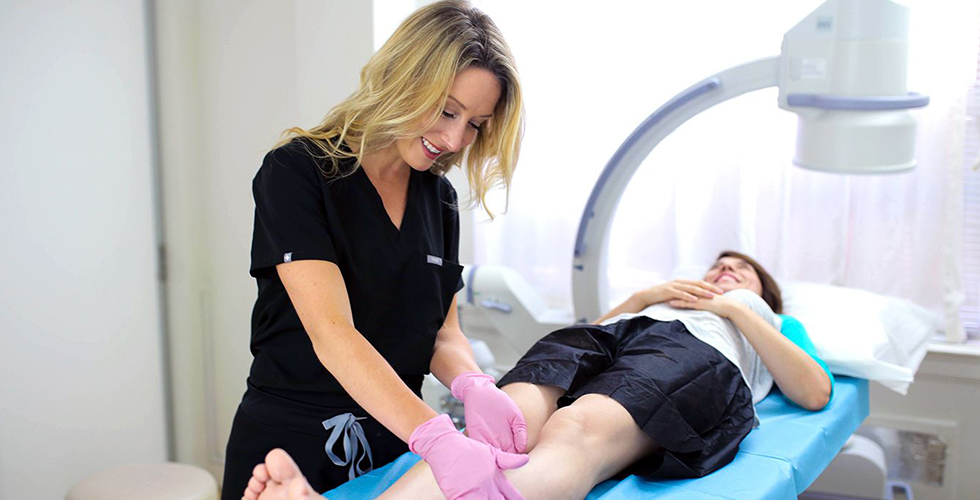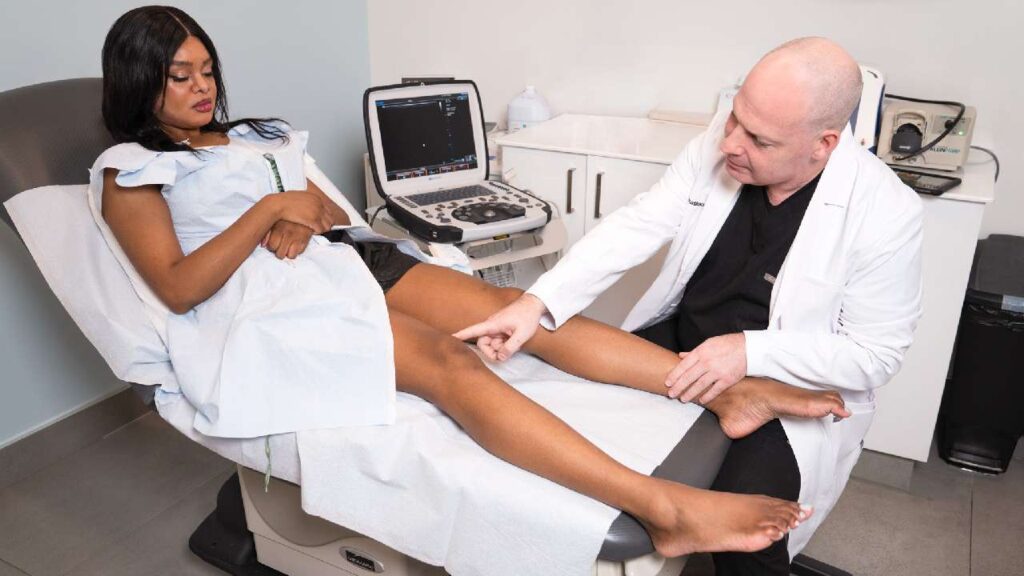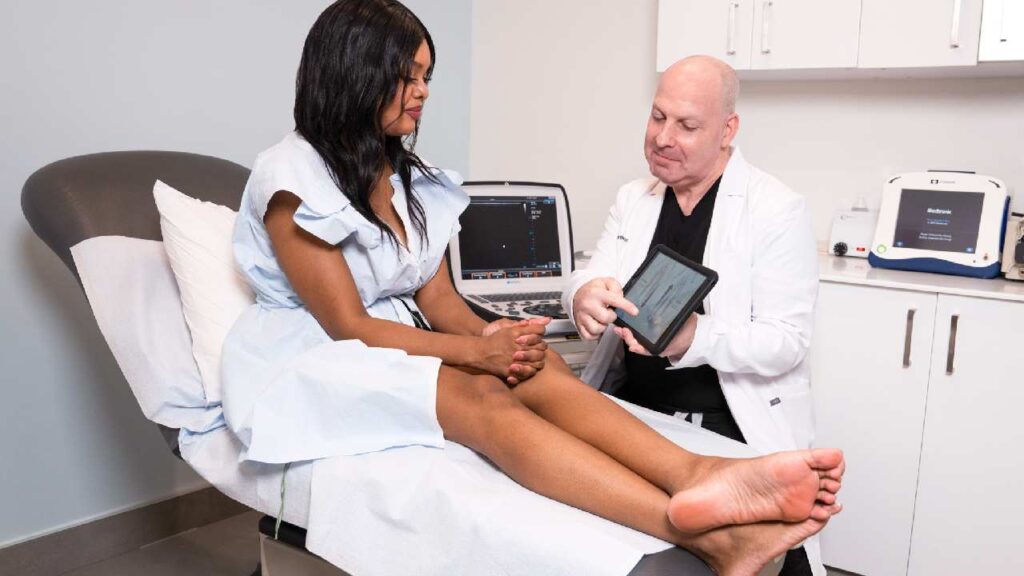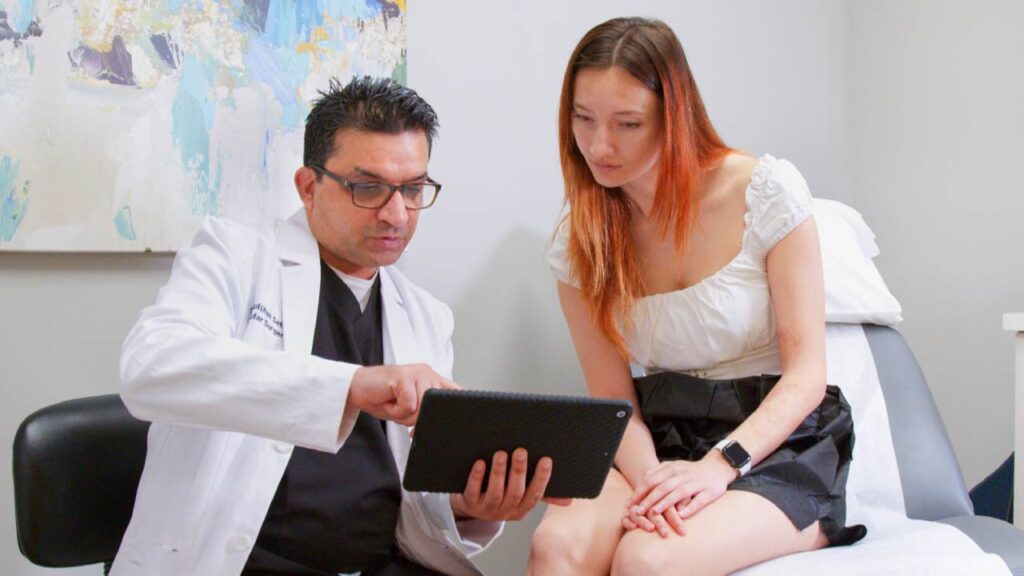Is Varicose Vein Removal Covered by Insurance in NY?
Are varicose vein treatments covered by insurance in New York? The short answer is yes. It depends on your health insurance policy and your symptoms, but many vein treatments are covered by insurance with vein doctors who can prove medical necessity. Book an appointment with Harvard-trained vein doctors in New York who accept all major insurance plans, including Medicare. Our patients routinely acquire full coverage for procedures like sclerotherapy, radiofrequency ablation, endovenous laser ablation, vein adhesives, and mechanochemical ablation. Since our vein specialists are trained in venous ultrasound, we’ll produce images to indicate why treatment is deemed medically necessary.

Is Varicose Vein Surgery Covered by Insurance in NY?
Varicose vein surgeries are more invasive than treatments like sclerotherapy, so they aren’t always deemed medically necessary. But insurance plans typically cover surgery for patients who need it. Some varicose vein surgeries require general anesthesia and hospitalization. So, varicose vein surgery costs are higher than minimally invasive varicose vein removal costs. The good news is most patients don’t need varicose vein surgery. Newer treatments have largely replaced traditional vein stripping surgery, eliminating fees for things like anesthesia and hospital stays. Visit our minimally invasive varicose vein treatment clinic for gentle, affordable vein care.
Does Medical Cover Varicose Vein Treatment That’s Cosmetic?
If your procedure is considered cosmetic, some insurance plans won’t cover it. Varicose veins laser treatment cost can be high if it’s not covered. That’s why it’s important to choose a vein doctor with venous ultrasound technology. They can analyze all of your veins and prove the issue starts with a broken valve or blood clot, or whatever the cause may be. Surface vein damage, especially on the legs, is rarely just cosmetic. But cosmetic clinics can’t look any deeper, so choose a vein doctor who can. If you’re required to try compression stockings before your plan approves insurance coverage, we’ll provide the right ones and the evidence you need.
Does Blue Cross Blue Shield Cover Varicose Vein Treatment?
Yes, Blue Cross Blue Shield covers varicose vein treatments. They cover procedures for both vein damage and vein diseases like Chronic Venous Insufficiency, which cause most varicose veins. To approve vein disease treatment, they look at clinical, etiological, anatomic, and pathophysiologic factors. These include things like spider veins, varicose veins, edema, ulcerations, cramping, heaviness, aching, and skin irritation in the legs. Click here to read how varicose vein treatments are covered by Blue Cross Blue Shield.
Does Medicaid Cover Varicose Vein Treatment?
Yes, Medicaid covers several varicose vein treatments when they’re medically necessary. Most of their insurance plans require a six-week trial of conservative therapy first. These include weight loss, exercise, wearing compression stockings, or periodic leg elevation, depending on your issues. They have different determining factors for certain procedures. For instance, they rarely cover treatment for veins developed during pregnancy, without waiting to see if they resolve. And they don’t cover treatments that aren’t approved by the FDA. Click here to read about insurance coverage with Medicare and Medicaid.
What Are the Cigna Varicose Vein Policy 2022 Updates?
Like many insurance carriers, Cigna recently added more vein coverage to their policies. As of 2022, several varicose vein treatments are covered by Cigna, providing the patient has certain symptoms. Cigna’s plans vary, but most require a vein doctor’s documentation of pain, edema, phlebitis, cellulitis, stasis dermatitis, or recurrent bleeding. Cigna expects a Duplex Ultrasound evaluation within 12 months of seeking coverage. This is why it’s essential to choose a doctor with ultrasound training. It’s impossible to prove medical necessity for certain veins without ultrasound testing. Some patients have visible symptoms like bleeding or ulcers, while others have invisible issues like venous reflux or blood clots. Click here to read what a Cigna insurer will cover.
Does Kaiser Cover Varicose Vein Removal?
Kaiser Permanente is both a medical provider and an insurance provider. As such, they cover varicose vein treatment for procedures performed by their doctors. However, if your vein doctor is not in network with Kaiser, they can typically adjust your rates. But this is one insurance plan with a few strings attached. Call our vein clinics for a free insurance estimate, so you’ll know exactly what to expect.
Is Spider Vein Treatment Covered by Insurance in NY?
Spider vein treatment coverage is a bit different than varicose veins. When spider veins develop in the legs, they often stem from the same thing varicose veins do– Chronic Venous Insufficiency. Spider veins in the legs can also become symptomatic, when they’re caused by valve failure and venous reflux. Treating these veins is often deemed medically necessary. However, small, facial spider veins can have other causes, like sun damage or skin injury. These aren’t as easy to get covered, since some insurance carriers consider them cosmetic. But, if you see a vein doctor, even facial veins can often be covered. Our team can prove why most spider veins need treatment, so book your consultation today!
Does Insurance Cover Spider Vein Removal at Cosmetic Clinics?
If you seek spider vein removal or varicose vein removal at cosmetic clinics, you’ll likely pay full price. These clinics rarely have the ultrasound technology or the training to prove medical necessity. Many of them are out of network with all insurance carriers. In addition, they often lack the tools to treat varicose veins, deep veins, and vein disease. The cosmetic sclerotherapy cost is higher than sclerotherapy for medical necessity. If you’ve paid full price for vein treatment before, the vein specialist might not have been a vein doctor. The term “vein specialist,” when correctly attributed, refers to a highly qualified vein doctor. Unfortunately, the term isn’t regulated. So, always inquire about a vein specialist’s training.
What Are the Average Vein Clinic Prices Without Insurance?
Without insurance, spider or varicose veins treatment cost ranges from a few hundred to a few thousand dollars. So, choose a vein clinic that accepts insurance and helps you acquire coverage. Our insurance team files all paperwork on your behalf, and we determine coverage before your appointment. Visit our accredited vein clinics to have vein treatments covered by insurance. All of our procedures are FDA-approved, and we use the least invasive procedures possible, so your treatment costs are low. For most patients, there are no out-of-pocket expenses.
Does a Vein Clinic Cost More Than a Cosmetic Clinic?
No, vein clinics do not cost more than cosmetic or dermatological clinics. Accredited vein clinics with board certified vein doctors use FDA-approved vein treatments that insurance companies cover. They also accept all major insurance plans, unlike cosmetic clinics. In addition, vein clinics with ultrasound technology can prove medical necessity of treatment for veins that other clinics can’t. Surface damage is only a small part of the issue, with most leg veins. So, see a vein doctor who can diagnose and treat the cause and prove it requires treatment.
Where Are Varicose Vein Treatments Covered by Insurance?
For varicose vein treatments that are covered by insurance in New York, there are several options. Visit our Midtown vein clinic at 290 Madison Avenue or our Financial District vein clinic at 156 William Street. We also have several clinics on Long Island, if that’s more convenient for you. Call us today for a free estimate on treating your varicose veins!





